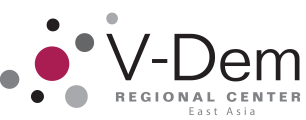Since 2014, the Varieties of Democracy (V-Dem) Project provides the largest and most comprehensive global dataset on democracy with some 27 million data points for 202 countries from 1789 to present. It includes approximately 400 disaggregated indicators to measure multiple conceptions of democracy, autocracy, and political development. The V-Dem database enables new ways to study the nature, causes, and consequences of democracy, embracing its multiple meanings. The V-Dem Project involves four Principal Investigators, three Project Coordinators, fifteen Project Managers with special responsibility for issue areas, more than thirty Regional Managers, almost 200 Country Coordinators, and over 3,000 Country Experts. It is hosted by the V-Dem Institute, Department of Political Science, University of Gothenburg, Sweden, and by the Kellogg Institute, University of Notre Dame, USA.
In December 2019, the V-Dem Project is going to establish a regional center for Eastern Asia (hereafter the Regional Center) in Japan. This is the sixth of the regional centers of V-Dem around the world, which includes centers for Eastern Europe & Russia, Southern Europe, Central Asia, North America, and Southern Africa. The missions of regional centers include conducting research focusing on democracy and democratization and releasing policy briefs utilizing the V-Dem dataset. The regional centers also host conferences and workshops and serve as platforms of collaborations among scholars and practitioners in advancing democracy in the regions.
The V-Dem East Asia Regional Center will be hosted at Keio University in Tokyo. The Center’s primary coverage of countries is Northeastern Asia (Japan, China, Mongolia, North and South Korea, Taiwan), but Southeast Asian countries are also included in its scope of studies and activities. Yuko Kasuya, a professor at the Faculty of Law of Keio University, will serve as the founding director. In addition to her academic activities, she served various administrative positions, including vice president of the International Political Science Association (2018-2020), board member of the Japanese Political Science Association (2016-present) as well as the Japanese Comparative Politics Association (2016-present). She also has numerous experiences of organizing international conferences inviting renown speakers, such as Francis Fukuyama (Stanford University) and Helen Clark (former head of UNDP and prime minister of New Zealand).
Objectives
Contribute to the production and dissemination of disaggregated and transparent measures based on a multi-dimensional conception of democracy for East Asian countries. The V-Dem measures enable practitioners to identify and monitor the relative status of democracy in their countries more accurately, analyze the conditions of different aspects of democracy, and provide insights about sequencing in a democratization or autocratization process. The regional center aims to make the V-Dem data more accessible among practitioners in East Asia countries by translating key technical and methodological materials to facilitate the practical use of V-Dem data.
Develop knowledge resources using the V-Dem data to assess and analyze the state of democracy in Eastern Asia countries. The regional center will generate visual graphs and analytical country reports based on the V-Dem data to review the development of democracy in different aspects in these countries, as well as thematic reports that allow for cross country comparison on particular dimensions. These reports and visualization will not only make data and findings more readily available and understandable for relevant readers in East Asia, but they will also serve as a means to draw attention to the development of democracy in these countries.
Support academic analyses based on systematic data that contribute to policy debates on democracy promotion at the regional level. By organizing yearly academic conferences and policy-oriented workshops, the regional center aims to encourage collaborations among scholars and practitioners in the region to better investigate and compare the trajectories of democratic development in these countries. Policy briefs based on the academic outputs will also provide insights for relevant policy decisions.
Activities
- Establish the regional center website, including the introduction of the V-Dem project and translation of core materials intro three languages (Japanese, Korean, and traditional Chinese).
- Create visualization based on the V-Dem data to delineate democratic development in Eastern Asia countries, with explanations in the three above mentioned languages.
- Hold annual academic conferences and policy-oriented workshops that invite scholars and practitioners focusing on democracy in the region. The paper presented at the meetings will be edited and published in the regional center working paper series and summarized as policy briefs. Policy briefs will be translated into the three above mentioned languages to enhance accessibility.
- Author and publish regional and thematic reports for Eastern Asia countries based on the V-Dem data.
